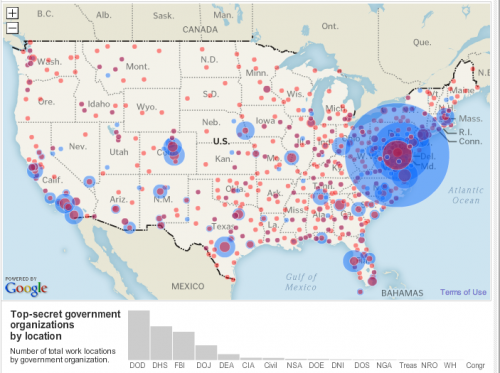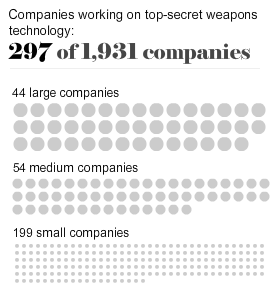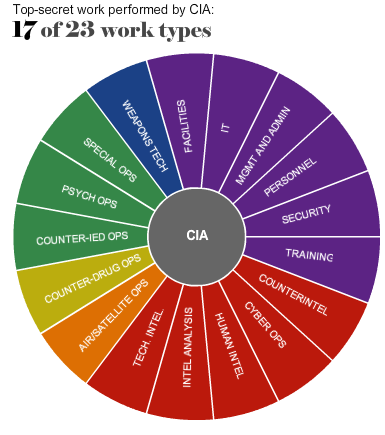The Washington Post recently posted a report called Top Secret America that looks at the proliferation of government organizations (many related to intelligence gathering) that require top-secret clearance and are largely unknown by the public and even many officials. Not surprisingly, the largest concentration is outside Washington, D.C.:
All of these places exist just outside Washington in what amounts to the capital of an alternative geography of the United States, one defined by the concentration of top-secret government organizations and the companies that do work for them. This Fort Meade cluster is the largest of a dozen such clusters across the United States that are the nerve centers of Top Secret America and its 854,000 workers.
…
Debate about the role of intelligence in protecting the country occurs only when something goes wrong and the government investigates, or when an unauthorized disclosure of classified information turns into news.
The existence of these clusters is so little known that most people don’t realize when they’re nearing the epicenter of Fort Meade’s, even when the GPS on their car dashboard suddenly begins giving incorrect directions, trapping the driver in a series of U-turns, because the government is jamming all nearby signals.
The site has an interactive map where you can see the locations of government (red) and associated private company (blue) locations:
You can also look at networks between agencies and companies working on different programs. Here’s some info on top-secret weapons development:
Types of work the CIA does:
There’s a database where you can look up contracted companies for each program or type of work, including location, who they work with, annual revenues, and more.
According to the editor, they spent two years on the investigation and each location is corroborated by at least two public records. They also talked to government officials about security concerns:
Because of the nature of this project, we allowed government officials to see the Web site several months ago and asked them to tell us of any specific concerns. They offered none at that time. As the project evolved, we shared the Web site’s revised capabilities. Again, we asked for specific concerns. One government body objected to certain data points on the site and explained why; we removed those items. Another agency objected that the entire Web site could pose a national security risk but declined to offer specific comments.
We made other public safety judgments about how much information to show on the Web site. For instance, we used the addresses of company headquarters buildings, information which, in most cases, is available on companies’ own Web sites, but we limited the degree to which readers can use the zoom function on maps to pinpoint those or other locations.
I would think there would be ultra-super-mega top-secret locations that their investigation couldn’t uncover because there wouldn’t be public records about them.




Comments 4
Mike — July 24, 2010
I don't know if I would say they are largely unknown. I grew up in Madison-Huntsville, AL (where you can see the big blue red dot in north Alabama) and everyone knew that secret defense stuff went down in the area. Many parents don't really mention what they do in their jobs and many teens go through the process of getting security clearance to work at the stores and pools on the Arsenal.
I even remember touring a few companies in missile-defense and spy satellite construction. We had to prove our citizenship and stuff like that to tour, and a friend of mine was denied access because she was Canadian and only in the United States with a visa.
In other words, I don't think I would call the situation unknown to the public. We all know things go down; we just aren't fully sure about what happens behind certain gates and doors (thus, I guess if you meant largely unknown of what is going down, I agree and sorry that I didn't interpret correctly).
Kelly — July 25, 2010
As someone who just moved to the DC/Baltimore area for school, I find this fascinating.
Laya — July 26, 2010
That's interesting about the GPS signals. I live in Baltimore, and my boyfriend lives in Greenbelt, MD (not far from DC). When he would bring me home late at night, I'd stay on the phone with him while he drove home on 295 and the signal always dropped in the same place. We always assumed it was because of the NSA (which has it's own, constantly patrolled exit off the highway), but maybe it was Fort Meade that caused the calls to drop.
Also, it's well know in the DC/Baltimore area that government contractors are some of the most active companies in the area as far as hiring. If you already have a clearance, you can pretty much work anywhere. If not, you have to prove you're worth it - clearances of the type you need to work, say, at the NSA or at Goddard, are time consuming and extremely expensive. Getting cleared can take as long as 18 months, and during that time you are extremely limited in what work you can do.
Jamie Young — September 20, 2022
"Top Secret America" is the latest in a long line of books about the United States' vast and shadowy intelligence apparatus. The book, by Dana Priest, a Pulitzer Prize-winning investigative journalist, and you can visit https://www.businessfirstonline.co.uk/advice/5-tips-for-choosing-a-professional-cv-writing-service/ to get more info, William Arkin, a longtime Washington Post reporter and author of "Code War," tells the story of how the National Security Agency began collecting information on Americans' phone calls, emails and Internet activity in secret after 9/11.